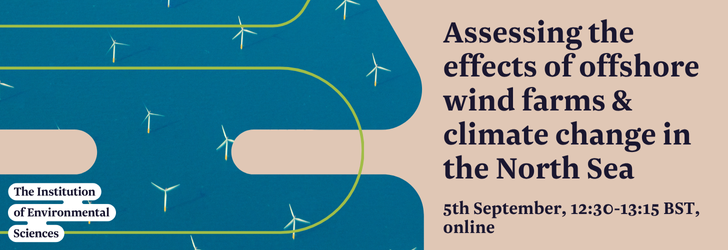The UK is committed to delivering up to 50GW of offshore wind by 2030. There are still gaps in our knowledge of the cumulative effects on marine life of a massive expansion of offshore wind farms (OWFs) – especially in combination with factors such as climate change and other human activities. The presence of turbines’ underwater structures and the extraction of wind energy will perturb the natural physical environment, and this can have cascading effects on the marine ecosystem. However, it is important to understand how big these perturbations are, and to define acceptable and unacceptable levels of change.
Speaker Dr Michela De Dominicis will explore the expansion of OWFs into deeper waters, where there is the potential for OWFs to perturb the natural ocean mixing, and as a result alter the timing and magnitude of seasonal stratification that underpins the seasonal cycle of primary production. This potential impact has not previously been a concern for OWFs installed in coastal waters, which are typically tidally mixed, but it represents an additional stressor to ecosystems in deeper offshore environments. In the PELAgIO project, Michela and colleagues are building an ocean and biogeochemical modelling system (FVCOM-GOTM-ERSEM) of the UK shelf to simulate how OWFs could perturb the physical environment in the whole North Sea, and the consequent changes in nutrients, oxygen and plankton distribution. Using the modelling system, present/future scenarios will be run to assess bio-physical changes induced by large-scale expansion of OWFs and compared with climate change effects.
 About Michela
About Michela
Dr. Michela De Dominicis is a Senior Scientist in the NOC’s Marine System Modelling Group. She is a physical oceanographer with 15+ years' expertise in marine numerical modelling. Her broad research interests are human-ocean connections (offshore and marine renewable energy, climate change mitigation and adaptation, coastal management and resilience). She uses ocean computer simulations to understand how the ocean will change in future decades under different “what-if” scenarios, investigating the impact of large arrays of offshore renewable energy devices (offshore wind turbines, tidal stream turbines), as well as the response of coastal areas to extreme weather and sea level rise.
She has worked at the National Oceanography Centre for the past 10 years. Prior to that, she was with the Italian National Institute of Geophysics and Volcanology. She holds a PhD in Hydraulic Engineering and a Master’s and Bachelor’s degree in Environmental Engineering, all from La Sapienza University of Rome.


